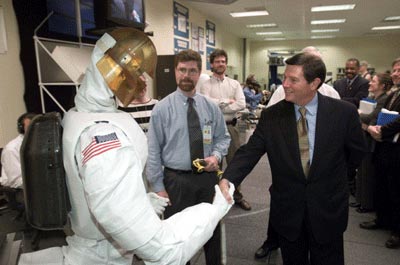Another dubious mandate?by Greg Zsidisin
|
| NASA’s increase not only flew in the face of an initiative to cut discretionary budgets across the board, but helped to deepen cuts those for other agencies. |
Moreover, the pork comes to O’Keefe in the form of a blank check. The legislation gives O’Keefe almost total flexibility over NASA monies, allowing him to allocate agency funds at his discretion, a measure the House Appropriations Committee describes in a press release as “unprecedented.” This, for an agency under fire for significant accounting problems.
NASA’s increase not only flew in the face of an initiative to cut discretionary budgets across the board, but helped to deepen cuts those for other agencies. It also joined a number of other controversial last-minute additions, including rules that will allow federally funded doctors and hospitals to deny services and even referrals to women, as well as a provision (soon to be removed) that would have given the leaders of key Congressional committees and their staffs access to private tax records.
Ignoring for a moment such arguments as due process, there is the issue of sustainability. As much as space enthusiasts may want a return to the Moon, it seems clear that Bush, DeLay, and O’Keefe have made their own mandate, and are relying on each other to carry this effort through.
Bush has not said anything publicly about his initiative since announcing it almost a year ago. After the January announcement, Bush has failed to mention the Vision for Space Exploration in the State of the Union address or in any other subsequent setting. Despite this, NASA spent 2004 restructuring itself around the plan without any real Congressional support or approval.
Bush, of course, will not be President past 2008, when the Vision for Space Exploration will still be ramping up, the shuttle will still be flying, and the ISS will still be unfinished. Assuming he did take a more active role advocating the program, he will leave office early in the program, with all its major milestones still reversible.
O’Keefe may or may not stay as NASA Administrator, depending on what other opportunities may arise. Certainly, these are heady days for him. A number of other potential successors might also serve as strong keepers of the Bush space plan, including Craig Steidle, the retired admiral and former Joint Strike Fighter program chief who currently heads the Office of Exploration.
In the meantime, Congressman DeLay has racked up a number of admonishments from the House Ethics Committee on such improprieties as appearing at a 2002 golf fundraiser hosted by Kansas-based Westar Energy, a contributor, before a House/Senate conference on energy legislation, and co-opting the FAA in a 2003 search for Texas Democrats who had fled the state to deny Republicans a quorum in their gerrymandering efforts. The chairman and ranking minority leader, in an October 2004 letter to DeLay, called his actions “beyond the bounds of acceptable conduct.”
| For the nearer term, the question is how long can the Vision for Space Exploration be sustained by backdoor politics? |
In September, three close DeLay associates were charged with laundering corporate monies and funneling them illegally to Republican candidates for the Texas Legislature. It appears that DeLay was kept aware of these activities, although so far there is no evidence that he was directly involved. Although it appears DeLay himself will not be indicted by the Texas grand jury investigating the case, House Republicans have nevertheless moved to protect him. Voting behind closed doors, the GOP changed a party rule that would have required DeLay to step down as House Majority Leader had he been indicted. Ironically, the GOP instituted the rule in 1993 to highlight the ethics issues of Rep. Dan Rostenkowski (D-Ill), chairman of the Ways and Means Committee.
With such a track record, one wonders how long DeLay will continue to dodge the bullets. Contrition does not appear to be one of this man’s strong suits, and there is still plenty of work to do in consolidating Republican power. It would not be surprising, then, if DeLay were to see more troubles ahead.
Of course, there are those who will say the ends justify the means. Here in The Space Review, Taylor Dinerman has already done so (“A Mandate for Exploration,” November 8, 2004.) They, like Dinerman, will say that the important thing is that space exploration will happen, and that the means of getting there will eventually be a mere historical footnote.
The argument as applied to this situation would then seem to be: space exploration first; democratic process, free speech, and women’s rights be damned. It makes you wonder what kind of a country we will have, and what kind of a people we will be, when we do finally return to the Moon.
For the nearer term, the question is: how long can the Vision for Space Exploration be sustained by backdoor politics? If Bush won’t promote a public and Congressional consensus for it during his second term, and the Vision’s chief benefactor is a Congressman with shaky ethics who may very well not be around throughout this multi-decade effort, how can this program survive?
